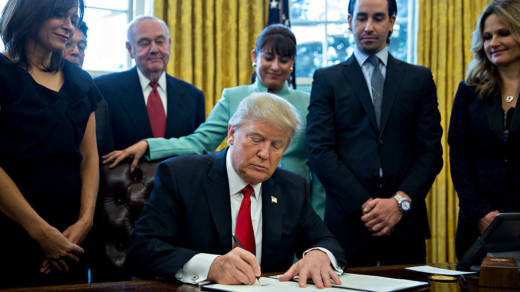Business groups applauded Trump's order. The National Federation of Independent Business calls it "a good first step on the long road toward eliminating ball-and-chain regulations."
Environmental groups, however, were dismayed. Center for Biological Diversity director Kieran Suckling called the new policy "as dumb as it gets." In a statement, Suckling said, "So you'll protect my drinking water but only in exchange for allowing oil drilling in national parks and more lead in my paint?"
Rolling back regulations has long been a goal of Republican and Democratic administrations, but it's not easy, as we've reported.
There are some 80,000 pages in the Federal Register, where all federal rules are published. But in order to repeal a regulation, a federal agency has to go through the same notice and comment rule-making process used to formulate new regulations. And that generally takes at least a year.
There is a workaround for newly enacted regulations, the Congressional Review Act. It gives lawmakers the opportunity to repeal regulations approved in the last 60 days of the congressional session. But that, too, is a time-consuming process. And given the Senate's need to act on Trump's nominations, it's likely that only a relatively few regulations will be repealed in this manner.
One is likely to come up this week. House leaders say they will attempt to repeal the stream protection rule, an Obama administration regulation that forbids coal companies from dumping rocks and other debris created by mountaintop removal mining into nearby streams.
Republicans and the coal industry say the regulation threatens jobs. The Natural Resources Defense Council says mountaintop removal mining, in which ground is blasted to access coal seams below, has been responsible for the destruction of 2,000 miles of streams in Appalachia.
Copyright 2017 NPR. To see more, visit http://www.npr.org/.
9(MDAxOTAwOTE4MDEyMTkxMDAzNjczZDljZA004))

9(MDAxOTAwOTE4MDEyMTkxMDAzNjczZDljZA004))
